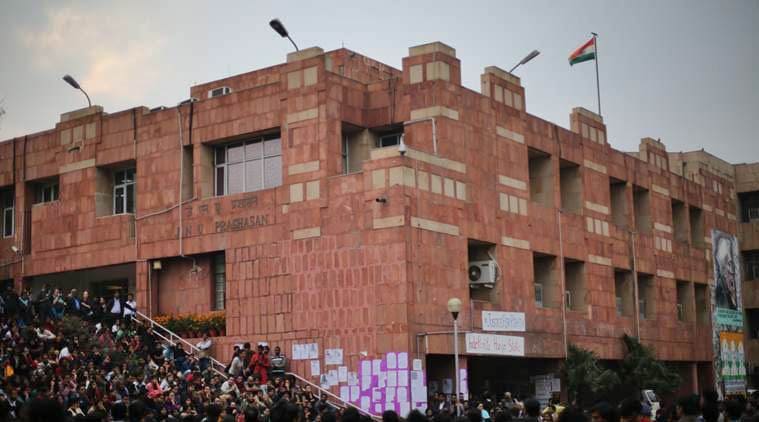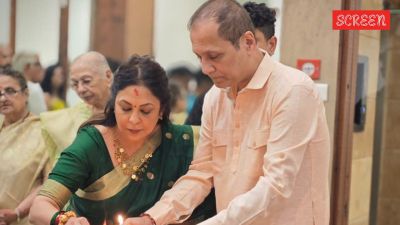Stay updated with the latest - Click here to follow us on Instagram
Degrees of Freedom: How an event three years ago has changed JNU
Heightened tensions between the administration, teachers and students, a shrinking space for dissent, and tighter norms — how an event three years ago has changed JNU.
 JNU students celebrate after former JNUSU president Kanhaiya Kumar returned to campus after getting bail, in 2016. (Express Archive)
JNU students celebrate after former JNUSU president Kanhaiya Kumar returned to campus after getting bail, in 2016. (Express Archive)
“Being the vice-chancellor of JNU is the best job I’ve done in my life. I’ve been a Union Minister, a member of the Planning Commission, but JNU has always been very special to me. Running the university is a difficult process, but these are some of the best children in the country,” says former Jawaharlal Nehru University V-C Yoginder K Alagh.
Once during his tenure, then JNU Students’ Union president Chandrashekhar Prasad, who was later assassinated in Bihar, had reportedly told Alagh he wouldn’t allow an Academic Council (AC) meeting to take place.
“There was supposed to be a discussion on getting a grant from Ford Foundation for the internal relations centre. He told us he wouldn’t allow the meeting to be held. I told him AC has to meet, if you object, we will set up a committee with you as a member, but he refused,” recalls Alagh.
“Sure enough, the next day they stopped me from getting into the AC meeting. Some deans told me to call the police, but I said I won’t do that. They asked me what my strategy was, I said I was dealing with young, idealistic people, and the only way was to appeal to their idealism. So I went on a hunger strike at the Administrative Block. I said it was my right to call an AC meeting and you’re stopping me from exercising that right. It went on for two-three days and then they came around. But I never called the police, I used to always sort out all these things myself,” he says.
Such a scenario is difficult to imagine in the JNU of today.
At the time of the February 9, 2016, incident, when alleged anti-India slogans were raised on campus, police had entered the campus to arrest then JNUSU president Kanhaiya Kumar. In the years that followed, the Administrative Block has become off limits for protests, and of late, JNUSU representatives say they are no longer invited to AC meetings.
At the country’s premier institute, the three years since the February 9 event, held to mark the hanging of Parliament attack convict Afzal Guru, have seen a sea change.
 Security at the Mandvi hostel in JNU. (Express archive)
Security at the Mandvi hostel in JNU. (Express archive)
Tighter security
On December 31 last year, JNU’s Chief Security Officer put out a circular saying security guards had been told “not to allow entry to any unauthorised person or vehicle” on campus. Residents were told to “cooperate” with security personnel in case they wanted to “frisk them or their vehicle”.
The JNU Teachers’ Association has cited the university’s annual report to claim that the administration spent Rs 9.52 crore and Rs 17.38 crore in 2016-17 and 2017-18 on security, including on guards, CCTV cameras and video-recording of events.“Earlier, there would be two-three guards at the main gate. Now, our number has increased to eight-nine. Autos and buses were never checked, but that has changed now. An outsider needs to make us speak to the person they’re visiting. All these are orders from above,” said a G4S security guard, who has been working in JNU for over a decade.
JNU Registrar Pramod Kumar did not respond to calls and texts, and Rector I Chintamani Mahapatra remained unavailable for comment as he was out of town.
In hostels, too, the situation is described as “tighter” than before. “Checking has increased, CCTVs have been put, our I-cards are checked every time we go to another hostel. If girls want to visit boys, they have to put down full details. Surprise checking in rooms have also increased,” said Simone Zoya Khan, the former JNUSU vice-president.
 JNU Administration block. (Express archive)
JNU Administration block. (Express archive)
Agree to disagree
Students also claim that room for debate and discussions, especially on contentious issues, has shrunk. A Kashmiri PhD student from Srinagar, who did not wish to named, said, “No matter where you stand on the Kashmir issue, there is hardly any open discussion or event on it in campus now. We are about 50 Kashmiri students who have an informal group. Shortly after the incident, we decided we won’t air our views on such matters anymore.”
“After the February 9 incident, my family in Srinagar was approached by intelligence agencies who took details about me. Nothing happened after that, but they must have made a list of all Kashmiri students studying in JNU. I wasn’t even present at that event,” he said.
Seven of the 10 students named in police’s sedition chargesheet are from Kashmir.
Since the 2016 incident, the All India Students’ Association claims it was denied permission to hold talks on the court judgment on Section 377, and entry of women into Sabarimala. The NSUI claims it couldn’t hold celebrations for Nehru’s birth anniversary.
In August 2016, to monitor events on campus, new rules were introduced, according to which organisers would have to ensure all participants provide their details. Additionally, the entire proceeding of each programme would be recorded and JNU security would be “empowered” to check identity cards of all participants.
Faculty members further claim even seminars and conferences organised by centres have come down. Rohit, assistant professor at the Centre for Economic Studies & Planning, said, “Earlier we used to have slots for seminars in our time-table. Every Tuesday, the Centre used to keep two periods free. Now that slot itself has gone.”
Professor Rajat Datta from the Centre of Historical Studies said that in his centre, the weekly seminars were continuing, but the university had stopped providing funds for other conferences and seminars.Vikas Bhushan and his father, who have been running the canteen in the School of Social Sciences-I for the last 40 years, would cater at such talks and seminars. “We would get two-three events every month… but last year, there was not a single event,” he said.
The 24×7 dhaba used to be open till 5 am before 2016, but in September that year, was told to reduce timings till 11 pm.
Changing political landscape
The aftermath of the February 9 incident also saw sharp political polarisation. The Left groups, which had almost always fought against each other in JNUSU polls, were forced to come together against ABVP. In 2016, the AISA and SFI joined hands. The following year, the Democratic Students’ Federation joined the Left block, and finally last year, the All India Students’ Federation was brought into the fold.
“The anti-India slogans completely exposed the Left in the campus and outside. They became scared of the ABVP and our growth and joined hands,” said Vijay Kumar, president of ABVP’s JNU unit.
Students and teachers also speak of heightened hostility between the JNU administration and the JNUSU and JNUTA. An increase in disciplinary notices meant that since February 2016, the JNU administration has collected at least Rs 10.5 lakh from students in fines, according to data accessed by The Indian Express through RTI and other sources.
Certain measures taken by the JNU administration — compulsory attendance for students and teachers; online exams for students; doing away with GSCASH and replacing it with an Internal Complaints Committee; not recognising the current JNUSU leadership; and stopping leaves for teachers who refuse to abide by attendance norms — have further deepened the chasm.
According to former JNUTA president Ayesha Kidwai, since 2016, there would be around 120-130 cases regarding JNU in the Delhi High Court, whether pending or settled.
The strides
Authorities, though, cite the progress made on campus in the last three years. A new School of Engineering was set up, along with the Atal Bihari Vajpayee School of Management and Entrepreneurship. The Special Centre for Sanskrit Studies became the School of Sanskrit and Indic Studies, and four new centres were created.
Last year, JNU celebrated its second convocation after 46 years, and in 2017, it got the Visitor’s Award for Best University. It also ranks high in the National Institutional Ranking Framework — number 3 among all universities in India in 2016; and number 2 in 2017 and 2018. Some alumni, though, remember a more tolerant JNU. A senior police officer and alumnus of JNU, who was also a Councillor from the School of International Studies, said, “We allowed others to express their views, and never reacted in a violent or unconstitutional manner. In our time, hard questions would be asked but things remained at the verbal level. I cannot imagine a better campus than JNU.”







